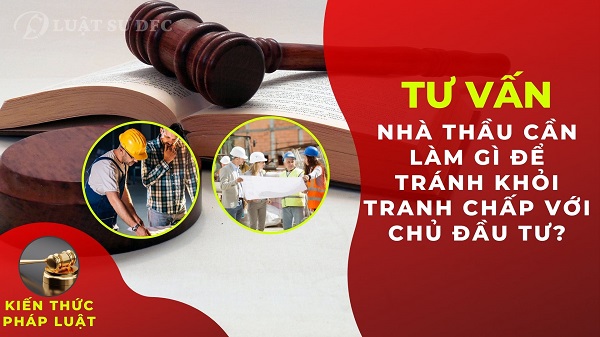In order to limit disputes and damages, contractors should pay attention to some issues after cooperating and working with the Investor.
 What should contractors do to avoid disputes with investors?
What should contractors do to avoid disputes with investors?
Construction is a difficult operation that takes a long time and has many problems and disputes between the parties in the contract. Especially for construction contractors, due to the role of hiring and applying for jobs, they often suffer more difficulties and disadvantages from the investor.
These disadvantages occur right from the stage of contract negotiation to the implementation and handover of works. In order to limit disputes and damages, contractors should pay attention to some issues after cooperating and working with the Investor.
1. In the stage of negotiation and signing of contracts
With the characteristics of unders working units, there should be a need to find a job of subcontractors; so when signing construction contracts with the main contractor, the investor; subcontractors often sign with the sample terms already built by investors and main contractors; or accept to abide by unfavorable terms for contractors.
These are the terms of progress, conditions and procedures for testing the quality of works; on procedures, procedures for advance, payment and settlement of sanctions for violations ... The investor always provides strict and strict procedures and procedures to bind responsibilities to contractors.
Many contractors when signing contracts, firstly, may be subjective, study the contract or have research but do not fully understand, do not offer to clarify unclear agreements should agree to the terms of the contract invested by the investor.
Example:
A small construction contractor, only receiving labor for the construction of a leveling item for the project. In the contract, the main contractor used the construction contract form in other parts to apply to the leveling item. Accordingly, the main contractor will be responsible for retaining 10% of the contract value to serve the settlement stage.
When the leveling item is completed and the payment is required, the construction contractor will know that his/her contract is only paid up to 90% of the value. 10% have to wait until the work is completed, and the full settlement will be paid. Here we see that the contractor only receives the labor part, not the complex item, containing technical elements, technology, gray matter but has been retained the contract value to make the settlement. It was an inappropriate agreement, causing damage to subcontractors.
When signing contracts, subcontractors need to negotiate and discuss clearly the settlement responsibilities for this part. It is possible that the contractor will not have to make a settlement or have to be withered 10% of the contract value.
2. In the process of payment for works
In the construction contract,"The investor will advance 30% when the material arrives at the foot of the project and is confirmed by the investor". However, when supplies arrive at the construction plant, due to many objective subjective reasons, the two parties only have minutes of delivery and receipt of goods supplies, there is no record of material commissioning.
During construction, the prestige and relationship of the two sides are very good; the contractor is not interested in the conditions for contract advance, on the other hand, the investor can also advance part (but lack compared to regulations) so the contractor continues to install materials and equipment into the works.
When the construction works are almost completed, the contractor shall request the investor to carry out the payment. At this time, if the investor proposes to present the dossier of payment commissioning, the contractor does not have a record of commissioning when the equipment arrives at the works. In particular, some input documents of missing or missing equipment cannot be supplemented. Therefore, it took a lot of time, effort and cost to convince the parties to complete this signing record.
Through the above incident, it has revealed the subjectability and showed the limited professional capacity of the contractor. The contractor was not serious, did not make strict records in the first place; do not fully prepare the input quality documents as soon as the goods are brought to the project. The contractor must request the investor to accept and confirm as soon as the supplies and equipment arrive at the works.
In case the investor does not confirm, does not allow installation into the works, suspends the construction ... thus, it both puts pressure on the investor to test and ensure strict and safe dossiers put into the works. Avoiding the case, when the groin is installed because of some error factor if the goods are not of the prescribed quality, the contractor must spend the cost of dismantling and looking for replacement of new equipment. Then the damage to the contractor will have to increase a lot.
3. Advice from DFC Lawyers
During the legal consultancy operation, the DFC team of lawyers has been approached and resolved a lot of disputes for contractors. Contractors are often disputed by investors and main contractors when they refused to sign acceptance dossiers, did not approve the value of work settlement for subcontractors.
The process of advance and payment does not comply with the contract regulations; thereby causing difficulties for subcontractors; resulting in subcontractors abandoning works, not continuing construction and requesting the suspension of contracts. At that time, in order to protect the contractor, the contractor must be calm and patient even have to accept the reduction in value because of being forced by the investor to cut.
Contractors try to supplement the completion of dossiers, sign and receive the value in the maximum way. On the contrary, if the contractor is in a hurry, refuses to shrug, the investor will prolong the time, do not sign the dossier of payment, the contractor is very difficult to request payment of the contract. These are the disadvantages and great disadvantages of subcontractors when encountering such investors and main contractors and this situation occurs very commonly in construction activities in Vietnam in the current period.
Over the past 17 years, DFC has cooperated with units of corporations and corporations such as Licogi Infrastructure Construction Corporation, Song Da Construction Corporation, GT 1 Construction Corporation (cienco1) as well as other economic groups to help them in consulting , making dossiers of settlement and recovery of capital from works where investors and contractors do not pay debts to contractors.
To limit risks and prevent disputes that are harmful to contractors. DFC recommends that contractors be cautious from the time of agreement on economic contract terms; strictly how to close the dossier to request the investor or the main contractor to sign the dossier of work collection there; to fully export value-added invoices, ensuring certain legality for dossiers before taking into calculation drastic plans such as initiating lawsuits against investors in court.
Ls. Le Minh Cong


